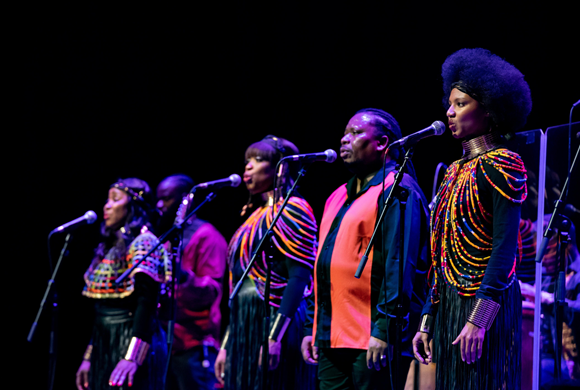
April 2023 - Reed All About It
“It’s a bit geeky…” smiled our Executive Director of Finance Stephan Heaton as we sat down for the workshop. As well as managing the books here at Liverpool Philharmonic, Stephan is an oboist and he had invited a big name of the double reed world to come along to the Hall. Travelling all the way from Frankfurt, Germany, Udo Heng, the General Manager of Reeds ‘n Stuff, had arrived in Liverpool to deliver a masterclass – a personalised deep dive into crafting and perfecting those pieces of cane that can make or break the woodwind section. And assembled to soak up his wisdom and experience were players from the Orchestra – oboists and cor anglais players Ruth Davies, Anna Cooper and Drake Gritton, bassoonists Rebekah Abramski and Gareth Twigg, and Ruth’s oboist daughter, Ella.
So, a little context… Reeds ‘n Stuff is a company that designs and manufactures machines that help bassoonists et al. get their reeds just right. The passion project of Udo, the company came about as he (himself an oboist) grew frustrated with the old, inadequate equipment available to double reed players and began coming up with ideas to revolutionise the process of reed making. The business grew, and now Reeds ‘n Stuff produces impressive kits and machines to help musicians get their reed production down to a fine art.

Well, I say a fine art, but reed making seems to be an intricately complex mix of incredible scientific precision, an artistic touch… and also trial and error. If, like me, you’re completely new to the mystical world of reed production, here’s the low-down on the process.
A double reed player first takes a piece of cane. To the amateur eye, this looks identical to one you’d use in the garden, but don’t be fooled – the type and properties of the cane are key. Then the process begins by splitting the cane into three pieces. Next up, time for gouging – manipulating the cane until it’s the desired thickness. Then we have shaping, where the newly slimmed down cane is cut into the required shape. And finally, the reed undergoes profiling – the consuming (almost obsessive) process of shaving and scraping and cutting the reed until it’s completely perfect. This can happily take hours and hours.
So there’s a set method, but it’s certainly capable of inducing madness… It’s a process of so many variables – different types of cane behave and react differently, cane ‘grows’ as the fibres absorb water, different points on the reed affect different aspects of the sound it produces, and, ultimately, each player, instrument and piece require different shapes and styles of reed – and a millimetre of cane can make all the difference.

That’s where Udo steps in… Becoming the first orchestra in the UK to invest in double reed production, Liverpool Philharmonic has purchased some of Udo’s machines – helping musicians perfect the shaping and profiling of their reeds. Double reed players are taught to make reeds by hand, just using their instincts, experience and a Stanley knife to guide them – but Udo’s machines make the process a whole lot easier and quicker. So no wonder there was a real sense of excitement amongst the Orchestra musicians gathered at the workshop as Udo set out his machines and demonstrated the wonders they were capable of – for a double reed player, it was like Christmas had come early.
A font of knowledge, Udo fielded questions from the group over the next few hours, sitting down with every musician to help them adjust the machines and personalise their reeds. Conversation bounced from calibration to millimetre-perfect dimensions, virtuosos of the double reed community to varieties of cane. As a newcomer to this world, it was hard not to be impressed by the precision and craft behind the process, if not a little overwhelmed, and that feeling only increased as Udo leant over to show me a few fine shavings of cane taken by the shaping machine – “that right there is an entire world for an oboist”, he said.

Chatting to the players as they pored over cases of perfectly prepared canes, it became clear just how much of their practising time is spent tinkering with and finetuning their reeds. “There’s no point having the notes at the point of perfection if the reed isn’t – and vice versa. It’s so important to strike a balance between making reeds and practising the piece,” they say. “And always have a back-up practice reed.” It’s a process that’s different for everyone, varying from continent to continent (Americans are “obsessed with constant reed making”, says Udo, whereas Europeans “start the process way ahead of when the reed is needed – they know that things in life take time”), and player to player. Some are more scientific in their approach, knowing the exact measurements of different reeds, while others rely more on an artistic flair and general feel of the cane. And of course, it is a hugely personal thing – two players using the same reed on the same instrument can produce two totally different sounds.
As the workshop wrapped up, and instruments and machines were packed away, you could see just how passionate each person in that room was about their craft – and how grateful the players were to Udo for helping to make their reed-making (and therefore lives…) that little bit more straightforward.
A huge thank you to Stephan for arranging the day, and to Udo for sharing your knowledge and skills here at the Hall – hopefully you’ll see our players (and their perfect reeds) in Germany soon.
Recommended
-
Most popular
-
Most popular
-
Most popular
-
Most popular
-
Most popular
-
Most popular










